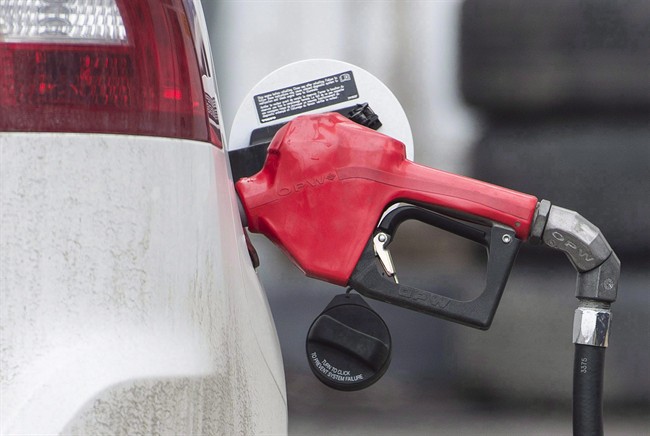Canadian motorists are headed toward some pain at the pumps in 2018, a new report warns. Gas prices will average $1.19 per litre over the year, the highest level since 2014, according to GasBuddy.

“Circumstances beyond Canada’s control, including a surging U.S. dollar versus a weaker loonie, increasing U.S. fuel demand and growing exports, will put a premium on what Canadians will pay at the pumps in 2018,” said GasBuddy senior petroleum analyst Dan McTeague. “We estimate pump prices will, therefore, rise an average of five cents a litre across the country.”
READ MORE: Don’t expect the price at the pump to get any better in 2018
Regionally, Vancouver, Montreal and Victoria will see the highest gasoline prices at $1.49, $1.45 and $1.41 a litre on average respectively. The cities with the lowest prices are expected to be Charlottetown ($1.26 per litre), Winnipeg and Saskatoon (both at $1.27 per litre).
If it’s any consolation, the price hikes are expected to hit Canadians’ wallets gradually, with the month of January seeing the lowest average prices ($1.13 per litre). But costs are set to go up, especially in the summer, when refineries switch to the more expensive “summer blend” gasoline, which is less volatile but cleaner. September will likely deliver the sharpest price pains, with the national gas price average peaking at $1.24 per litre.

Get weekly money news
WATCH: Deadly explosion at Austria’s main gas plant forces Italy to declare state of emergency

The price increase is expected even as Canada’s oil production is set to reach an all-time high of 4.2 million barrels per day and U.S. shale oil output is expected to hit 10.2 million barrels a day, also a record.
Indeed, that supply boost will likely be offset by a confluence of other factors. For one, major oil producers both inside and outside the Organization of Petroleum Exporting Countries (OPEC) have agreed to extend oil production cuts throughout 2018, precisely as a way to counteract the impact on prices of increased U.S. supplies.
A thriving global economy will also drive higher demand for fuel. Total world demand for oil is expected to grow past 100 million barrels a day for the first time ever, which will also help prop up prices.
That healthy demand for oil might also induce U.S. refineries to export their gasoline to foreign markets if prices there are higher than in the North American market. The phenomenon represents “a new price challenge for Canadian drivers,” according to the report.
WATCH: Gas prices rise ahead of holiday season

Still, Canadians aren’t entirely helpless in the face of higher gas costs.
“While many may think there’s no way to feel like you win at the pump, there’s certainly much motorists can do to soften the blow of paying for gas. One can easily ‘outsmart the pump’ by shopping around for the lowest price,” according to Patrick DeHaan, head of petroleum analysis at GasBuddy. There are plenty of apps out there to help drivers locate the cheapest gas.








Comments
Want to discuss? Please read our Commenting Policy first.